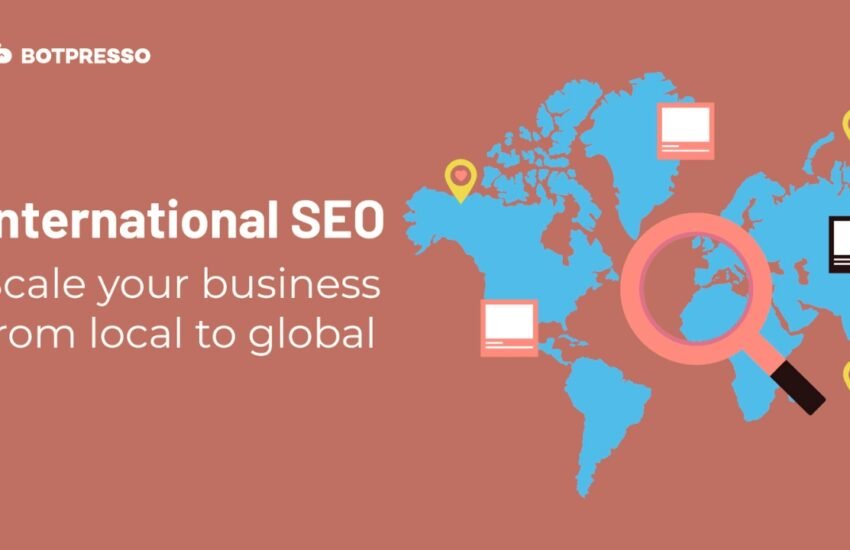In an increasingly borderless virtual economy, organizations ought to not only exist online—they have to thrive across markets. International SEO services have become the cornerstone for corporations trying to compete on a global scale. Whether you are an eCommerce brand targeting European shoppers or a SaaS platform breaking into Asian markets, your website needs more than just translation—it requires localization, technical optimization, and deep cultural intelligence.
This blog explores the intricacies of worldwide SEO offerings, why they matter, and how you can harness them to amplify your digital reach globally. As competition intensifies across markets, the demand for tailored, multilingual, and technically sound search engine optimization strategies is not just essential—it’s imperative.
What Are International SEO Services?
International SEO services are the gathering of strategies and practices aimed at optimizing a website so it may be discovered by search engines and users in multiple nations and languages. While conventional search engine optimization focuses on improving visibility within a particular geographic location, global SEO broadens this focus to encompass multiple regions, each with their unique search behaviors, languages, and preferences.
At its core, international SEO is about sending the right signals to search engines like Google, Bing, or Baidu to indicate which content is meant for which audience. It includes factors like hreflang implementation, URL structuring, multilingual keyword targeting, and cultural localization.
According to a study published in the Journal of International Marketing, websites optimized for multiple languages and regions saw an average 47% increase in conversion rates compared to non-optimized websites. This clearly indicates the direct impact of well-executed international SEO.
Building the Technical Foundation for Global SEO
To build a solid global SEO strategy, companies must first lay down a strong technical foundation. This includes optimizing the website structure, ensuring fast page load times in multiple regions, and setting up proper URL structures for different languages and countries.
There are three fundamental URL structures to consider:
- ccTLD (Country Code Top-Level Domains): Such as
.defor Germany or.frfor France. - Subdomains: Like
de.example.comorfr.example.com. - Subdirectories: Such as
example.com/de/orexample.com/fr/.
Each of these options has its pros and cons, but all should be paired with hreflang tags, which inform search engines which version of the content to show users based on their language and location.
Moreover, international websites must be mobile-friendly and optimized for Core Web Vitals, as Google’s algorithms continue to favor speed and usability across devices. Using Content Delivery Networks (CDNs) to serve content faster in remote locations is another essential tactic.
Language Localization vs. Simple Translation
One of the most common mistakes companies make is simply translating their website content rather than localizing it. Translation merely converts text from one language to another, while localization adapts the entire experience—including visuals, messaging, cultural references, and tone—to fit the local audience.
Consider this: A phrase that resonates with English-speaking Canadians may fall flat in French-speaking Quebec, even though both are part of the same country. Successful international SEO services ensure that content isn’t just understood—it connects emotionally and culturally.
“The biggest oversight in global marketing isn’t what you say, but how you say it. Localization builds trust; translation only builds comprehension.”
— Dr. Robert Johnson, Professor of Digital Linguistics, University of Cambridge
The Power of Cultural Relevance and Keyword Research
Keyword research for global SEO must go beyond simple translation. Tools like Google Keyword Planner, Ahrefs, and SEMrush offer region-specific insights, but human intelligence plays a critical role too.
For example, the term “sneakers” is commonly used in the United States, but in the UK, the same item might be searched as “trainers.” Optimizing for the wrong keyword—even if it’s linguistically correct—can result in lost traffic and missed opportunities.
Moreover, understanding cultural buying behavior is essential. For example, South Korean consumers may place a high value on community reviews, while German users prioritize data privacy. International SEO services incorporate these nuances into the keyword strategy, ensuring that content not only ranks but also converts.
Geo-targeting and Search Engine Preferences Around the World
Different countries use different search engines, and international SEO must take this into account. While Google dominates globally, Yandex is widely used in Russia, Naver in South Korea, and Baidu in China.
Each of these search engines has its own algorithms, requirements, and ranking factors. For instance, Baidu prefers sites hosted in China and favors Simplified Chinese characters, while Yandex ranks domains with local backlinks more favorably.
Geo-targeting, when combined with local hosting and appropriate domain extensions, significantly improves the chances of ranking in non-Google search engines. Businesses must also consider local laws around data protection, especially when targeting users in regions with strict regulations like the European Union’s GDPR or China’s Cybersecurity Law.
Crafting a Multilingual Content Strategy and Blog Approach
Creating valuable content for multiple regions involves more than just replicating your blog in other languages. It requires unique content strategies tailored to each audience’s interests, challenges, and stages of the buyer journey.
For example, a U.S.-based blog post about cloud storage may focus on security and price comparisons, while the same topic for Japanese readers might emphasize mobile accessibility and integration with domestic tech ecosystems.
Blogs, landing pages, and product descriptions should all be adapted individually, with special attention given to cultural preferences, tone, and even color symbolism. Yes, even color can impact conversion—while red symbolizes luck in China, it can signal danger in Western countries.
Multilingual content should also be updated regularly, as outdated pages can harm rankings, regardless of language. Utilizing local influencers or industry experts as guest contributors can further establish authority and trust, aligning with Google’s E-E-A-T framework (Experience, Expertise, Authoritativeness, Trustworthiness).
Tracking Performance Across Global Markets
Measuring the success of international SEO campaigns requires segmenting data by country, language, and device. Tools like Google Analytics 4 and Google Search Console allow for detailed performance insights.
Trackable metrics include:
- Organic traffic by region
- Bounce rates across different languages
- Conversion rates from localized landing pages
- Ranking positions in various country-specific SERPs
These metrics help refine the strategy and uncover hidden opportunities or underperforming markets. For more advanced insights, server log analysis can reveal crawl behavior by regional search engine bots, ensuring your content is being indexed correctly.
Why International SEO Services Are a Long-Term Growth Engine
While the initial cost of global SEO services may seem high—especially when factoring in translation, localization, and technical implementations—it’s vital to view this as a strategic investment. Once a multilingual website is properly optimized, it becomes a sustainable source of global traffic, leads, and revenue.
“SEO is not a quick fix. It’s a growth engine. International SEO is that engine working in multiple gears.”— Ann Smarty, Digital Strategist at Internet Marketing Ninjas
Investing in international SEO services now ensures that your brand remains discoverable, trustworthy, and competitive in markets you might not have even considered yet.
Conclusion: Think Global, Act Local
Expanding globally is no longer a luxury—it’s a necessity for growth-minded organizations. But going global doesn’t mean applying a one-size-fits-all strategy. It requires nuanced, location-specific, and technically sound solutions that only professional international SEO services can provide.
From crafting localized content strategies to executing advanced technical SEO across continents, global SEO empowers companies to connect authentically with diverse audiences. When done right, it transforms a brand from a local player to a global leader.
So as you map out your growth strategy, remember: ranking internationally isn’t just about being visible. It’s about being understood, respected, and chosen—wherever your audience may be.
you may also read
SEO Audit Services: 6 keys Success Now



